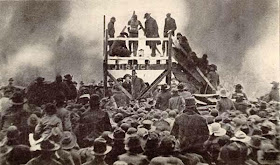This Sunday, PoemAlley and participants from the
regional poetry community share their thoughts on gender relations, inequality
and related topics clustering about that all-too ubiquitous (yet fatalistically
under-examined) institution of organized mass violence, which has become the roaring
hearth of American society over the last twelve years.
Part of the Unitarian Universalist Society in Stamford’s series of
lay-led summer services, "Sex, Love & War" will be hosted by Ralph Nazareth
and feature readings from himself and fourteen other poets, including Robin Kurtz,
Lisa Labazzo, Bob Sanders and Ronna
Schenkerman, with guest readings by Neil Silberblatt (organizer of the popular
state-wide Voices of Poetry series), Middlebury-based poetry therapist Marianela Medrano and Jane Wickham.
 In sympathy with the issues raised by such cases as Lynddie England's haunting, romantically-entangled
stint at Abu Ghraib, as well as the more recent focus on the prevalence of rape and sexual assault in the military, this Sunday’s presentation will use a combination of music, words and
video, both during and in the UU Social Room afterwards, to suggest how war
distorts love and loyalty and how sex and masculine identity are mis-defined to
validate endless armed conflict as normative.
In sympathy with the issues raised by such cases as Lynddie England's haunting, romantically-entangled
stint at Abu Ghraib, as well as the more recent focus on the prevalence of rape and sexual assault in the military, this Sunday’s presentation will use a combination of music, words and
video, both during and in the UU Social Room afterwards, to suggest how war
distorts love and loyalty and how sex and masculine identity are mis-defined to
validate endless armed conflict as normative. 
While the 2012 documentary, The Invisible War (see trailer below under "Additional Information") is laudable for campaigning against widespread sexual abuse within the American armed services, the question lingers as to how realistic it is to implement reform without first acknowledging such conduct as a byproduct of a belligerent foreign policy and the overtones of martial authoritarianism and privilege that permeate domestic entertainment, sports and culture--ranging from interrogation via sexual degradation at Guantanamo, the rape of an unconscious teen by Steubenville High football team members, jingoistic films (click here for a recent critique of Zero Dark Thirty), the "doing the Lynndie" photo craze following the aformentioned England 2004 scandal, not to mention the misogynistic half-time mascot theatrics seen in college and professional sports:
On the hopeful side, if the supposedly universal allure of conflict and power seem a timeless head-scratcher rooted inviolably in our nature
or genes, maybe it only seems that way due to a lack of honesty to investigate
its origins, because the toddlers from this 2010 Yale study of innate empathy sure
don’t have trouble defying it:
Where:
Unitarian Universalist Society in Stamford
20 Forest Street (right across from the Avon Theatre)
Where:
Unitarian Universalist Society in Stamford
20 Forest Street (right across from the Avon Theatre)
When:
10 AM,
Sunday, July 28, 2013
Contact:
203-348-0708/www.uusis.org____
Additional Information:
War and Sex: ABrief History of Men's Urge for Battle
John V. H. Dippel
Prometheus Books, 2010
Prometheus Books, 2010
The New
Press, 2011
On Killing: The Psychological Cost of Learning to Kill in War and Society
Dave Grossman
Back Bay Books, 2009
The Better Angels of Our Nature: Why Violence Has Declined
Dave Grossman
Back Bay Books, 2009
The Better Angels of Our Nature: Why Violence Has Declined
Steven Pinker
Viking Adult, 2011
Sex and War: How Biology Explains Warfare and Terrorism and Offers a Path to a Safer World
Malcolm Potts and Thomas Hayden
BenBella Books, 2010
Invisible War (2012) trailer:













